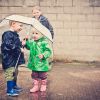-
 +19 +3
+19 +3Wolves Are Still the Bad Guys in Children’s Media. Let’s Change That.
By portraying predators as villains, we are influencing how our children perceive the natural world
-
 +23 +4
+23 +4What Children Lose When Their Brains Develop Too Fast
Adverse early experiences can make young minds inflexible, while a carefree childhood has clear cognitive benefits.
-
 +24 +4
+24 +4Facebook still won’t give up Instagram for Kids
Even under serious political pressure, the company insists its products aren’t inherently harmful for young users.
-
 +11 +2
+11 +25 Simple Ways to Introduce Your Kids to Environmentalism
It’s no secret that our planet is in trouble. The pollution, environmental carnage and global warming are not only a big deal but they are our big deal. The human race has spent hundreds of years evolving into a mindless species that forgot where we came from. Instead of tending to the earth, living with her harmoniously and putting her health first, we are essentially destroying our life source. Where do we go when the earth is no longer an option?
-
 +16 +4
+16 +4The number of young children with lead poisoning may be about to more than double
The CDC has unveiled a stringent new standard that's expected to bring the number of children ages 1 to 5 considered to have high blood lead levels from about 200,000 to about 500,000.
-
 +25 +3
+25 +3Whistleblower: Facebook's response to child abuse 'inadequate'
A former Facebook employee has told US authorities the company's efforts to remove child abuse material from the platform were "inadequate" and "under-resourced". The allegations are contained in documents seen by BBC News and submitted to the US Securities and Exchange Commission (SEC) two weeks ago.
-
 +20 +3
+20 +3Facebook must prioritise children’s wellbeing, Zuckerberg is told
Facebook has lost the trust of parents, is prioritising commercial gain over children’s needs and must take steps to restore faith in its platforms, a global alliance of child protection campaigners and experts has warned Mark Zuckerberg.
-
 +11 +1
+11 +1Kids and their computers: Several hours a day of screen time is OK, study suggests
New data suggests that lots of time on screens may even improve peer relationships. But the study comes with caveats.
-
 +12 +3
+12 +3Do screens really hurt kids? Not much, and they may have some benefits
Screen time may not be as harmful as previously suspected for school-aged children and may have some important benefits, according to one of the largest studies to date exlporing how screens impact youth.
-
 +15 +1
+15 +121 Of The Most WTF Moments From "Round The Twist"
Remember when a children's show featured nudity, a propellor penis, AND casual incest?
-
 +9 +2
+9 +2Skateboarding 'makes me feel like I'm flying'
At just four years old, Autumn California Bailey is already a skateboarding success with more than 120,000 Instagram followers. Autumn, from Brighton, has been inspired by the Olympic performance of Sky Brown and has dreams of competing in future games.
-
 +1 +1
+1 +1Having a go: US parents say Peppa Pig is giving their kids British accents
Parents across the US say their children are acquiring British accents, thanks to Peppa Pig. Linguistic experts have cast doubt on such claims, but some parents insist the “Peppa effect” has their American children saying “mummy” instead of “mommy”, using phrases such as “Give it a go”, and pronouncing tomato “to-mah-to”, not “to-may-to”.
-
 +4 +1
+4 +1Teens around the world are lonelier than a decade ago. The reason may be smartphones.
The largest increases occurred in Slavic, Baltic, English-speaking and Latin American countries.
-
 +3 +1
+3 +1At Just 16 Months Old, Toddlers Will Reward Someone For Acting Fairly
Although we often think of young children as rather selfish, research has shown that babies and toddlers have a surprisingly strong sense of what is fair. At one year old, kids already expect resources to be divided fairly and for people to be helpful towards others. By two, they themselves tend to distribute resources equally, and would rather play with a fair adult than an unfair one.
-
 +20 +2
+20 +2Self-harm warning signs can appear decade earlier
Early warning signs of self-harm can appear in children almost a decade before it starts, say researchers. The team at the University of Cambridge found two distinct groups that were more likely to harm themselves. The first included those who struggle to control their emotions, and the second featured youngsters more willing to take risks than others their age.
-
 +20 +3
+20 +3Vaccination rates are going back up thanks to the teens
After vaccination rates declined earlier this month, the United States’ campaign to get every American inoculated against COVID-19 got a much needed boost from the youths. According to the New York Times, 2.5 million children aged 12 to 15 have gotten at least one dose of the vaccine and 23 percent of kids aged 12 to 17 have received at least one dose. Earlier this month public health experts began fretting about declining vaccine rates as most of the adults who wanted a vaccine were able to access one.
-
 +21 +4
+21 +4Immediate Skin-to-Skin Touch Could Save The Lives of Many Preterm Babies, Study Shows
When a baby is born prematurely, immediate skin-to-skin contact could save their lives.
-
 +20 +4
+20 +4Reading To Young Children Stimulates Brain Development, Creates Nurturing Environment
Research from the 5B45 initiative showed the more words little children were exposed to, especially before they turn five-years-old, the better. Experts said reading not only builds their brains, but helps a child feel nurtured and loved.
-
 +19 +4
+19 +4Do Girls Really Show More Empathy Than Boys?
By Emma Young. Girls seemed to show more empathy in recent study, but results are far from conclusive.
-
 +17 +6
+17 +6Not so wicked afterall
Although the fairy tale of the wicked stepmother is a tale as old as time, the effects of blending children with their new stepfamilies may not be as grim as once thought. In fact, new research shows that stepchildren are not at a disadvantage compared to their peers from single-parent households and actually experience better outcomes than their halfsiblings — good news for the more than 113 million Americans that are part of a steprelationship.
Submit a link
Start a discussion




















